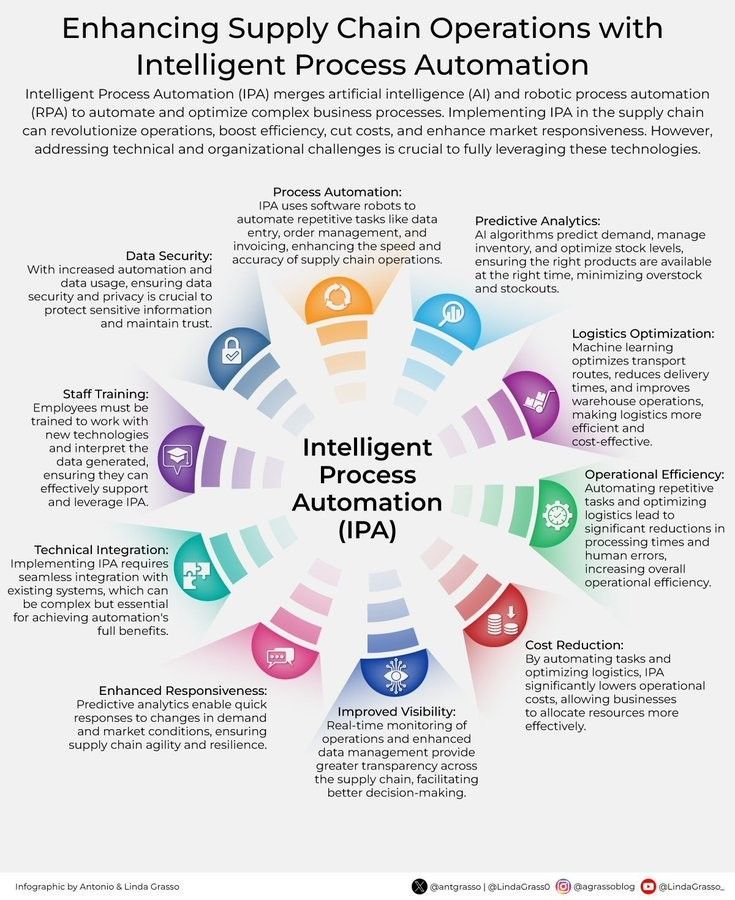In today’s fast-paced business environment, the integration of intelligent process automation in supply chain operations has become a game-changer. Leveraging technologies such as Robotic Process Automation (RPA), Artificial Intelligence (AI), and Machine Learning (ML), companies are transforming their logistics and supply chain management to achieve unprecedented levels of efficiency and accuracy.
The Role of AI and ML in Supply Chain Forecasting
Artificial Intelligence and Machine Learning are revolutionizing supply chain forecasting by providing unprecedented accuracy and efficiency. These technologies enable companies to predict demand more accurately, manage inventory effectively, and reduce waste, addressing some of the most significant challenges in supply chain management. According to a recent article on Logistics Middle East, AI and ML are expected to significantly impact the supply chain industry by enhancing operational efficiency and significantly reducing waste.
One of AI’s key benefits in supply chain forecasting is its ability to process and analyze large datasets in real-time. This capability allows companies to identify patterns and trends that may not be apparent through manual analysis. For instance, generative AI can provide predictive probabilities of future disruptions, enabling companies to proactively manage risks and avoid potential supply chain bottlenecks.
AI-Powered Robotics in Warehouse Automation
AI-driven robots are making intelligent decisions, optimizing operations, and continuously improving over time. This advancement is redefining the way warehouses operate, offering enhanced productivity and reliability. A notable example is the AI-powered pick and place robots by Smart Robotics, which are transforming warehouse automation by increasing efficiency, accuracy, and adaptability. This is particularly beneficial for industries like e-commerce and pharma ecommerce where precision is critical. Find more in the article on Logistics IT.
Process Mining and Optimization
Process mining technology, combined with AI, is another critical component in enhancing supply chain efficiency. Companies like Celonis are using AI in their process mining platforms to transform supply chain and logistics operations. This technology presents companies with a living digital twin of their end-to-end processes, enabling them to optimize supply chains, reduce costs, and improve efficiency.
Warehouse Logistics and Sustainability
Warehouse logistics is a crucial part of the supply chain. Employing technologies like AI, ML, and the Internet of Things (IoT) can improve efficiency and reduce the carbon footprint. Companies are transitioning into greener operations such as renewable energy utilization and reducing waste, while aligning supply chain routes effectively. Find more in an article on Logistics IT.
Overcoming Digital Interoperability Challenges
AI in Supply Chain Management for Mid-Market Companies
Didero is using AI to solve supply chain management challenges at mid-market companies. Their AI-powered supply chain management software suite automates tasks for mid-market companies that lack the resources of larger enterprises. This end-to-end solution covers supplier discovery, contract negotiation, purchase orders, invoicing, payments, and analytics. The potential to democratize sophisticated supply chain management and make it accessible to mid-market businesses is discussed in a TechCrunch article.
Conclusion
The integration of intelligent process automation in supply chain operations is not just a trend but a necessity in today’s competitive market. Technologies like RPA, AI, and ML are enabling companies to achieve higher efficiency, accuracy, and sustainability in their supply chain operations. As businesses continue to adopt these technologies, the future of supply chain management looks promising, with endless possibilities for innovation and improvement.
Check out more AI tools.
Elevate Guest Experience with RoomGenie
Textify Analytics – Affordable Insights at the Speed of AI
